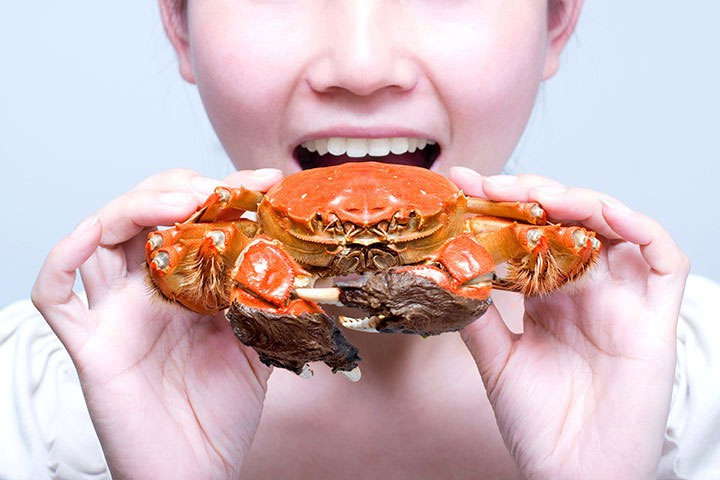How to eat crabs?
Steaming is the best way to retain nutrition in crabs; When brewing more beer, ginger helps increase flavor, disinfect and warm the stomach.
Crab meat is nutritious, but not everyone knows how to eat crab properly. Here are the notes when eating crabs, according to Life Time.
How to choose crabs
There are many types of crab on the market. Depending on the type of water raised, crabs can be classified into sea crabs and freshwater crabs.
In terms of nutrition, sea crabs and freshwater crabs are both high-protein, low-fat foods. However, sea crabs contain more unsaturated fatty acids and freshwater crabs have higher levels of cholesterol.

Steaming is the best way to retain the original nutritional value of crabs.(Photo: MF).
How to eat crab properly
Nutrition experts believe that in crab bones there are bacteria such as Vibrio parahaemolyticus and Paragonimiasis that are easy to cause poisoning and allergies. So before eating crabs, you need to cook.
Steaming is the best way to retain the original nutritional value of crabs. When steaming, you can combine it with beer, ginger, and onions. Thus, you have just increased the flavor of the crab and completely sterilized the bacteria while warming the stomach in the autumn of winter.
Note , each meal should only eat from 40 to 75 g of seafood, ie 1-2 crabs. Crab contains a lot of protein so if you eat a lot, it will lead to indigestion, digestive system and allergy.
Should and should not eat more crabs
Some people believe that crabs should not be eaten with tomatoes because the vitamin C in tomatoes can cause crab organic arsenic to turn into harmful inorganic arsenic. However, through surveys and experiments, Beijing Food Safety Monitoring Center (China) concluded that the combination of tomatoes and crabs had no effect on the chemical transfer process.
In addition, crabs are very good food for pregnant women, help supplement nutrients such as calcium, protein, omega-3, B group vitamins, support strong bones and firm teeth. Pregnant women just pay attention to eating moderate crabs and absolutely avoid live crabs like crab salad.
Patients with hepatitis, gastric mucosa edema, biliary excretion, digestive dysfunction should not eat crabs because crabs are easy to induce indigestion and bloating. Crab bricks are high in cholesterol, not suitable for people with cardiovascular disease. Gout patients and people who are allergic to seafood should also limit their intake of crabs.
- Top of unprecedented species of crabs
- Giant sea crabs with fishermen nets
- Catching super rare purple crabs caused a stir
- Video: Hold 1,000 crabs in the palm of your hand
- Giant crabs weigh up to 4kg
- How to choose crabs, delicious and meaty crabs
- Australia: Red crabs are in danger because of oil spills
- Chinese netizens voluntarily eat less invasive crabs to save the US ecosystem
- Who should not eat crabs or crabs?
- Giant sea crab long by car
- Giant crab monsters, climbing, snatching and lightning fast
- Discover exotic virgin crabs and Hoa Binh specialties
 Green tea cleans teeth better than mouthwash?
Green tea cleans teeth better than mouthwash? Death kiss: This is why you should not let anyone kiss your baby's lips
Death kiss: This is why you should not let anyone kiss your baby's lips What is salmonellosis?
What is salmonellosis? Caution should be exercised when using aloe vera through eating and drinking
Caution should be exercised when using aloe vera through eating and drinking